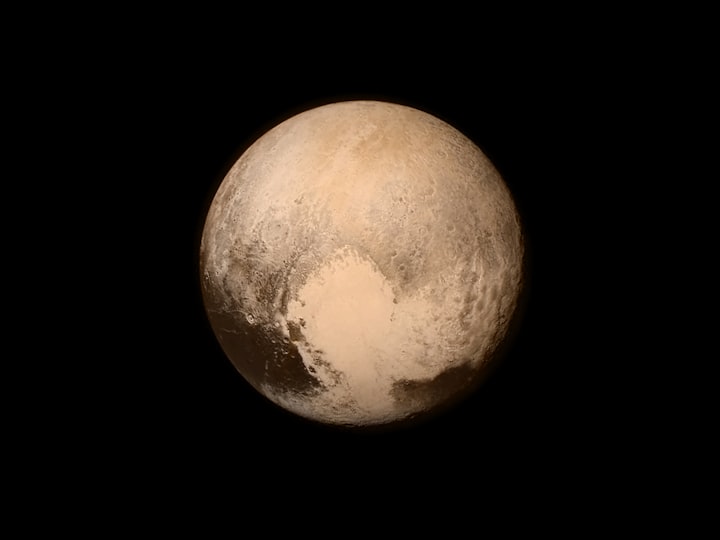Attention, please. Listen carefully as I present to you an interesting fact. In the past, if you attended elementary school before 2006, there is a high probability that you were required to memorize a sentence similar to the following: "Now listen up my very eager mother just served us nine pizzas." This sentence served as a mnemonic device to help children remember the order of the planets in our solar system: Mercury, Venus, Earth, Mars, Jupiter, Saturn, Uranus (pronounced Uranus, no escaping that), Neptune, and Pluto. Now, if you are currently in elementary school, you might be wondering why there were nine planets before. However, before you go back to playing Fortnite or whatever the current trend is, let's address the question of what happened to Pluto. It hasn't disappeared or moved anywhere; it still exists on the outer edge of our solar system, just as cold and distant as ever. So, what changed? Well, it's not Pluto itself that changed, but rather our understanding of it. We have gained a much greater knowledge of space in the past century. It's worth noting that Pluto was only discovered in 1930, so the lineup of planets has been modified before. Nevertheless, there is something inherently peculiar about demoting a planet. Who would have thought that such a thing could happen? Now, I'm curious to know your opinion. Should Pluto still be considered a planet, or is its current classification appropriate? Please share your thoughts in the comments. Perhaps things will become clearer once we establish a precise definition of the word "planet." Over time, the exact definition has undergone significant changes. However, from the time of Galileo to the 19th century, a planet was generally defined as any object orbiting the Sun. This definition may seem somewhat vague, but it worked well until the year 1801. It was in that year that astronomers discovered Ceres, a celestial body located between Mars and Jupiter, in what we now know as the asteroid belt. If Ceres had shattered into numerous fragments, as some asteroids have, I'm certain that students would pay much closer attention in their science classes. However, astronomers quickly realized that Ceres was relatively small, with a radius only half that of Earth's moon.After the discovery of Ceres, the Astronomy community was filled with excitement when they found another planet called Pallas the following year. This trend continued with the discovery of more planets in the subsequent years. However, as the number of new planets grew into the thousands, astronomers realized the need to reassess their definitions. These newly discovered objects, known as asteroids in the asteroid belt, had more similarities with each other than with the traditional planets. They were small, barren, and often lacked a spherical shape. Despite this, the world continued to recognize the seven planets: Mercury, Venus, Earth, Mars, Jupiter, Saturn, and Uranus (or Uranus). Neptune joined the group in 1846, followed by Pluto 84 years later. With the benefit of hindsight, it may seem predictable that Pluto would face a similar fate as its distant relative, Ceres. However, our understanding of Pluto has evolved significantly since the early 20th century. Initially believed to be similar in size to Uranus or Neptune, subsequent measurements revealed that Pluto's size was closer to that of Earth. Over time, astronomers discovered that Pluto is merely a small ball of ice and rock. In 2006, an accurate measurement finally confirmed that Pluto is only about 1/459th the size of Earth, making it smaller than our moon and just slightly larger than Ceres. Despite these revelations, Pluto's status as a planet had already been questioned since the discovery of its moon, Charon, in 1978. While having a moon might initially suggest planetary status, Charon's size relative to Pluto is not significantly smaller compared to the size differences between other planets and their moons they are actually quite similar in mass, with Charon's influence causing Pluto to wobble as it orbits the Sun. This behavior made some astronomers hesitant to classify Pluto as a planet, especially as more Pluto-like objects were discovered. However, the discovery of Eris in 2005, slightly smaller but more massive than Pluto, led to a reevaluation. The International Astronomical Union revised the definition of a planet in 2006, requiring it to orbit the Sun, be spherical, and clear its orbit of other objects. Pluto failed to meet the last criterion, leading to its reclassification. While some scientists advocate for Pluto's reinstatement as a planet, the debate continues.Some argue that the focus is too much on what surrounds the planets rather than the planets themselves. According to Ethan Siegel from medium.com, Mercury at the distance of Jupiter would not clear its orbit and would not qualify as a planet. A world smaller than Mercury could be considered a planet around a red dwarf star. Even Earth would not be classified as a planet if it were located in the Oort cloud. On the other hand, what about stars like Proxima Centauri, which orbits the larger and brighter Alpha Centauri A and B? It meets all the criteria to be considered a planet, despite being a star. Can something be both a star and a planet simultaneously? Conventional wisdom suggests otherwise, but this is the dilemma faced when defining terms like "planet." Perhaps it is time to reconsider how we define planets. However, increasing the number by a factor of 14 does not seem like a viable solution. Unfortunately, Pluto will likely not be included in any new definitions. And let's not forget that Pluto was not named after the Disney dog - never mind..
Thanks for reading, please consider subscribing.
.
About the Creator
Josh
exploring the universe and it's mysteries.. nature, planets, fictions and facts.






Comments
There are no comments for this story
Be the first to respond and start the conversation.